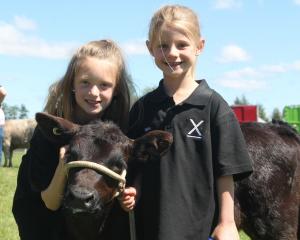
Rather than relying on nutrient tests, the wider assessment of soil health is expected to help the farming business maintain productive land for future generations.
A study, funded by the Our Land and Water National Science Challenge, evaluated soil quality at the farms against new metrics designed by AgResearch and Ravensdown.
AgResearch soil biology scientist Dr Nicole Schon said they now had more insights in Ngai Tahu’s soil health by broadening the way its wellbeing was assessed in tests on farms converted from forestry over different years.
"We tried to do a comprehensive assessment of the soil going beyond just soil fertility to get a more complete picture of the health of the soil. The soil is a living eco-system which is able to provide us lots of good eco-system services, but we need the soil to be healthy to provide these services."
Samples were tested from five sites including forestry land and irrigated dairy pasture that had been converted from forestry only a few years ago.
The tests evaluated soil fertility, organic matter, their physical condition, and biological activity.
Biological indicators were introduced to see variations in forestry land and irrigated pasture conversions.
Dr Schon said their measurements were put in a large table of data with optimal targets, but presentation into radar plots made it easier to see differences between the sites and where the gaps were.
Among the differences, scientists found the soil biology had yet to reach optimal levels and took longer to do so. There were also variations in organic matter and the carbon to nitrogen ratio.
"This work shows we can go beyond thinking about nutrients and what fertiliser we might apply to get our fertility levels right as farmers are already doing. So this is taking it a step further to look at the different properties in the soil and if things aren’t quite right then the next question is: how do we get to those right levels?"
She said they were continuing to work with Ngāi Tahu and measuring the wider health of the soil for a regenerative trial on their farms and looking to see if it would change over time.
Work on soil health is also being carried out in other projects, such as the Advancing Soil Health project on Synalit and Danone dairy farms.
Dr Schon said soil health assessments were being carried out on farms, and when indicators were not on target management recommendations were provided for farm owners so they could work towards target ranges and improve the overall soil health.
"Making sure we have healthy soil is really important because the soils provide a huge range of services and if farms don’t have a well functioning soil then I suppose they have to put more inputs in to get the same out of the system. Ultimately, we want to make the most out of that natural resource that is the soil and get it functioning to the best of its ability. That has benefits for the farm system and for the wider environment."

“We developed a suite of tests with AgResearch that gives a more comprehensive assessment of the soil, allows effective long-term monitoring, and can be easily rolled out on-farm. The results give Ngāi Tahu Farming a clear and functional picture of soil health at each site that hasn’t previously been available.”
Mr Roberts said soil health could be difficult to gauge because of differences across soils and a range of factors that contribute to healthy soil.
“Understanding where to start and what to measure can be difficult. You might test phosphorus availability and find that it’s low, but you won’t know that the soil is also compacted, which means nutrients aren’t the full answer to plant production.”
By comparing results from different sites they could confirm the method identified the needs of different soils and could catch complexities.
The study looked to evaluate the potential impact of Ngāi Tahu Farming’s agricultural practices on soil fertility and health and ensure long-term land productivity for future generations.
Ngāi Tahu Farming general manager Matthew Keen said the company now had an in-depth assessment for further insight into improving the environment and soil health at its North Canterbury sites.
He said measurable scientific solutions, such as those delivered by the study, would provide them with long-term benefits as they continued work towards achieving a more sustainable farming system.
















